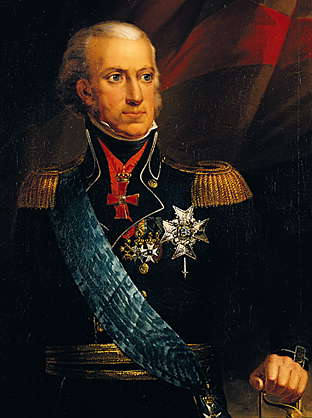Charles XIII of Sweden
|
|
Charles XIII, Karl XIII, or Carl II, (1748-1818), king of Sweden and Norway, the second son of king Adolf Frederick of Sweden, and Louisa Ulrica of Prussia, sister of Frederick the Great, was born at Stockholm on October 7, 1748.

| |
| Reign | From June 6, 1809 in Sweden
|
| Coronation | |
| Royal motto | "Folkets väl min högsta lag" ("The good of the people my supreme law" ¹ ) |
| Queen | Hedwig Elizabeth Charlotte |
| Royal House | Holstein-Gottorp |
| Predecessors | Gustav IV Adolf in Sweden
|
| Successor | Charles XIV, as the Swedish title and
|
| Date of Birth | October 7, 1748 |
| Place of Birth | Stockholm |
| Date of Death | February 5, 1818 |
| Place of Death | Stockholm |
| Place of Burial | Riddarholmskyrkan, Stockholm |
| ¹ Compare with the U.S. state of Missouri (1821): "Let the welfare of the people be the supreme law". | |
| Contents |
Life and politics
In 1772 he co-operated in the revolutionary plans of his brother Gustav III of Sweden. On the outbreak of the Russo-Swedish War of 1788 he served with distinction as admiral of the fleet, especially at the battles of Hogland (June 7, 1788) and Öland (July 26, 1789). On the latter occasion he would have won a signal victory but for the unaccountable remissness of his second-in-command, Admiral Liljehorn. On the death of Gustav III, Charles, now duke of Sudermannia, acted as regent of Sweden till 1796; but the real ruler of the country was the narrow-minded and vindictive Gustaf Adolf Reuterholm, whose mischievous influence over him was supreme. These four years were perhaps the most miserable and degrading in Swedish history (an age of lead succeeding an age of gold, as it has well been called) and may be briefly described as alternations of fantastic jacobinism and ruthless despotism. On the accession of Gustav IV Adolf of Sweden (November 1796), the duke became a mere cipher in politics till the March 13, 1809, when those who had dethroned Gustav IV Adolf appointed him regent, and finally elected king by Riksdag of the Estates. But by this time he was prematurely decrepit, and Jean-Baptist Bernadotte took over the government as soon as he landed in Sweden, 1810. By the Union of Sweden and Norway in 1814 Charles became king of Norway under the name Carl II of Norway. After eight years as king only by title, Charles died on February 5, 1818.
Children
He had married his cousin Hedwig Elizabeth Charlotte of Holstein-Gottorp (1759-1818), on July 7, 1774 but both of their children would die in infancy.
- Louisa Hedvig (1797)
- Carl Adolf, Duke of Wermelandia (1798)
See also
References
| Preceded by: Gustav IV Adolf | King of Sweden 1809-1818 | Succeeded by: Charles XIV/ Carl III Johan |
| Preceded by: Christian Frederick | King of Norway 1814-1818 |
de:Karl XIII. nl:Karel XIII van Zweden ja:カール13世ヨハン fi:Kaarle XIII sv:Karl XIII
